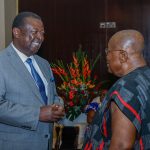Think Tanks, diplomats, scholars and professionals drawn from various fields have lauded the Chinese path to modernization which they say offers important lessons for nations, particularly in the developing world.
They argued that Chinese modernization, with five key features, exhibits China’s commitment to help open up a broader path to development which other nations can benefit from, by providing opportunities for cooperation, especially between Beijing and other countries.
Speaking during the Hong Ting Forum organized by Xinhua News Agency in Kenya’s capital Nairobi, Kuang Weilin, a member of the public diplomacy consultation committee of the Chinese Ministry of Foreign Affairs, noted that China has over the years uniquely demonstrated that it cannot walk alone or seek to rise at the expense of others in her quest to attain development.
“China is for win-win cooperation and common development so that other countries, especially the Global South can benefit from China’s development and modernization,” said Kuang even as he reiterated China’s willingness to share its experience with others in efforts to launch major development programmes.
Kuang, a former Chinese ambassador to Sierra Leone and Head of the Chinese Mission to the African Union says the East Asian nation means well to the world highlighting its open desire to promote political multi-polarity, international multilateralism, cultural diversity, peaceful co-existence, dialogue based on equality among different civilizations and a community with a shared future for mankind.
“China has no interest at all in challenging anyone else or seeking to replace anyone else as the world’s number 1. What it strives for most is to achieve rejuvenation of the country to make it a better place to live in and contribute to the world peace and development,” he said

The diplomat was categorical that China only seeks to contribute to world peace and stability and help create favourable conditions for development both at home and beyond. He reiterated that China will never poke its nose into the internal affairs of other countries.
The visiting Chinese official said China will continue to hold structured engagements with African countries over necessary support in their priority areas, citing development realized through programmes such as the Belt and Road Initiative. In the case of Kenya, he said the Standard Gauge Railway, the Nairobi Expressway, the Global Trade Center and hundreds of Chinese companies that operate in the country providing jobs for locals, offer testimony of excellent bilateral relations.
“China is ready to work with Kenya for more infrastructure projects and other programmes,” he said
His sentiments resonated well with those of Professor Peter Kagwanja, from the Africa Policy Institute. He said after many years of struggle, Africa adopted a ‘Look East policy’ to actively tap into the rapidly modernizing powerhouses in the Global South, with the continent forging new partnerships with China.
“After a decade of China-Africa partnership, Africa was firmly back on the path to modernization, the decades of slow growth were over, and its image changed. With an average of 5% annual growth over the first two decades of the 21st century, the world’s fastest, Africa became a new frontier of trade and foreign investments,” he said
“Chinese-style modernization has taught us one clear lesson: poverty is not a curse or destiny of any nation or civilization. In the four decades that followed the ‘Reforms and opening up’, China lifted an estimated 850 million of its citizens from the clutches of absolute poverty, thus liberating over 70 per cent of humanity from extreme poverty, the largest in human history,” added Prof Kagwanja
He stressed that China’s philosophy of ‘peaceful development’ shows that it is possible for the world to rise and develop without a military confrontation and conquest of the weak by the strong.
Dr. Hassan Khannenje from HORN Institute concurs. He says the peaceful rise of China with emphasis on population modernization, common prosperity, material and cultural ethical advancement and harmony between humanity and nature demonstrates how the world can avoid the tragedies associated with what he described as “predatory and exploitative modernization,” and the ugly face of monopoly capitalism.
“The Chinese model becomes not just a case study for analysis by scholars, but a model that holds transformative potential for African countries as well as many in the global south,” he said
“Within the framework of the BRICS, FOCAC, Global Development Initiative, Global Security Initiative, and Global civilization initiative, China- Africa relationship can be enhanced towards programmatic undertakings that would support mutual modernization of African economies not just through infrastructural development but fundamentally, through agricultural modernization, technology transfers, educational exchanges, security sector support and conflict resolution, an area that Africans would greatly welcome in the wake of failed imported experiments from the west,” Dr Khannenje averred





